| Korean Med Educ Rev > Volume 24(2); 2022 > Article |
|
Abstract
We use the concept of the “doctor’s role” as a guideline for developing medical education programs for medical students, residents, and doctors. Therefore, we should regularly reflect on the times and social needs to develop a clear sense of that role. The objective of the present study was to understand the knowledge structure related to doctor’s job competencies in Korea. We analyzed research trends related to doctor’s job competencies in Korea Citation Index journals using text network analysis through an integrative approach focusing on identifying social issues. We finally selected 1,354 research papers related to doctor’s job competencies from 2011 to 2020, and we analyzed 2,627 words through data pre-processing with the NetMiner ver. 4.2 program (Cyram Inc., Seongnam, Korea). We conducted keyword centrality analysis, topic modeling, frequency analysis, and linear regression analysis using NetMiner ver. 4.2 (Cyram Inc.) and IBM SPSS ver. 23.0 (IBM Corp., Armonk, NY, USA). As a result of the study, words such as “family,” “revision,” and “rejection” appeared frequently. In topic modeling, we extracted five potential topics: “topic 1: Life and death in medical situations,” “topic 2: Medical practice under the Medical Act,” “topic 3: Medical malpractice and litigation,” “topic 4: Medical professionalism,” and “topic 5: Competency development education for medical students.” Although there were no statistically significant changes in the research trends for each topic over time, it is nonetheless known that social changes could affect the demand for doctor’s job competencies.
한국에서 의사가 되기 위해서는 의과대학의 정규교육과정을 마치고 의사국가고시를 통과해야 한다. 의과대학의 교육은 사회에서 기대하는 의사역량에 기반한 역량 중심의 교육과정으로, 의사면허를 취득한 시점부터 환자 진료가 가능한 수준의 직무역량을 갖추는 것을 목표로 하고 있다. 현재의 사회는 의사에게 예전에 기대되었던 것에 비해 더 높은 수준의 역량을 요구하며, 역량이 순차적으로 발전되고 확장되는 지속적 역량개발을 강조하고 있다[1].
의사의 역량이란 의사가 할 수 있는 것(what the doctor is able to do), 진료하는 방식(how the doctor approaches his/her practice), 전문가로서의 의사(the doctor as a professional)를 의미하며, 지식, 기술, 태도를 모두 포함한다[2,3]. 역량에 기반을 둔 교육은 일반적으로 적절한 역량이 무엇인지 결정하고, 교육프로그램을 고안하고, 적절한 평가방법과 최소 합격기준을 설정하는 네 단계로 개발된다[4]. 의사에게 요구되는 ‘역량’은 임상적, 문화적, 지리적 맥락에 따라 달라지기 때문에[5], 핵심 역량을 무엇으로 결정할 것인가의 문제는 역량 기반 교육을 계획하는 데 있어 중요한 문제이다. 캐나다의 경우는 ‘CanMEDS (Canadian Medical Education Directions for Specialists) 2000 project’로 의료전문가에게 요구되는 일반역량을 규정하였고[6], 미국은 Accreditation Council for Graduate Medical Education의 6개 핵심 역량으로 의학전문가(medical expert), 대화자(communicator), 협력자(collaborator), 건강수호자(health advocate), 관리자(manager), 학자(scholar), 그리고 전문가(professional)를 제시하였다[7]. 영국은 의과대학생을 위한 ‘Tomorrow’s doctors’와 전공의 Good Medical Practice에서 공통역량을 제시하고 있다[8].
한국에서도 2007년 한국의학교육평가원 기획연구개발위원회의 전공의 공통교육과정에 관한 연구를 시작으로 역량개발에 관한 연구가 진행되어 오고 있다[1]. 한국의 의사에게 요구되는 덕목과 역량은 최근 개정된 ‘한국의 의사상 2022’로 ‘환자 진료’, ‘소통과 협력’, ‘사회적 책무성’, ‘전문직업성’, ‘교육과 연구’의 5영역 총 54개의 역할과 규정이 발표되었다[9]. 환자 진료는 의학지식과 진료 역량, 환자안전 역량으로 구성되며, 소통과 협력은 환자 및 가족(보호자)과의 소통과 협력, 보건의료인 및 사회와의 소통과 협력을 포함하고 있다. 사회적 책무성은 공중 및 국제 보건활동, 보건의료정책 참여로 구성되며, 전문직업성은 윤리와 자율성에 기초한 진료와 환자-의사 관계, 전문직 주도의 자율규제, 전문직업성과 자기관리 역량을 포함한다. 교육과 연구는 교육과 연구 역량으로 규정되어 있다. 한국의 의사상의 내용은 기본의학과정 및 졸업후과정 등에 지침으로 활용될 수 있으므로 한국 사회의 맥락을 반영하고 미래발전을 지향하는 개선작업이 지속적으로 이루어져야 한다[10]. 지금까지 국내에서 이루어진 의사역량 관련 이슈를 파악하는 방법 중 하나로 연구동향 분석이 있다.
연구동향 분석은 사회적 요구를 파악하는 방법의 하나로 지금까지는 체계적 문헌고찰 방법을 활용한 연구동향 분석이 주로 이루어져 왔다[11-13]. 그러나 체계적 문헌고찰은 소수 전문가의 지식과 고찰 때문에 선행연구를 분류하여 분석하는 것으로, 선행연구에서 사용된 개념과 맥락의 이질성으로 인해 기준 설정 시 주관성을 배제하기 어려워 분석대상이 제한적이라는 한계가 있다[14,15]. 이러한 한계를 극복하고 통합적으로 조직된 결과를 도출하기 위하여 최근 텍스트마이닝 기법으로 텍스트네트워크 분석이 자주 활용되고 있다.
텍스트네트워크 분석은 도구에 따른 분석대상의 제한이 없고, 연결망 형태의 특징을 도출하여 지식의 구조를 체계적으로 구성하여 설명할 수 있다는 장점이 있으며[16], 많은 양의 텍스트 내에 출현하는 영향력 있는 핵심 주요어를 발견하고 주요어 간의 연관성을 확인하여 직관적인 맥락 파악을 가능하게 한다[17]. 그리고 토픽모델링은 텍스트 내에 잠재된 주제를 찾아 각 주제의 연관성 및 분포를 분석하여 통합적인 정보를 제공함으로써, 미시적 측면에서 핵심 주제 및 관계를 확인하고, 거시적 측면으로 핵심 주제의 흐름 및 맥락, 시기별 토픽의 추세를 파악할 수 있게 한다[18,19]. 텍스트네트워크 분석을 통한 연구동향 분석은 시간의 흐름에 따른 연구의 변화과정과 미래 이슈를 전망하게 하며, 개념 간의 상호 관련성을 이해하도록 하여 지식구조의 맥락을 조직화하는 데 도움을 줄 수 있다.
따라서 본 연구에서는 텍스트네트워크 분석의 방법으로 지난 10년간의 국내 의사의 직무역량에 관한 연구에서 다루어진 핵심 키워드를 추출하고 키워드 간 네트워크를 분석하고자 한다. 그리고 국내 의사의 직무역량 연구에서 다루어진 주요 토픽이 무엇이었는지 분석하고, 각 토픽이 시간의 흐름에 따라 어떠한 변화를 보이는지를 밝혀 연구동향을 분석하고자 한다. 이는 한국의 의사 직무역량 개발에 대한 향후 연구주제와 발전적 방향을 제시하는 데 도움을 줄 수 있을 것이다.
텍스트네트워크 분석 및 토픽모델링 기법을 이용하여 ‘의사의 직무역량’과 관련된 국내 연구동향을 분석하였다. 텍스트네트워크 분석에 사용되는 프로그램은 NetMiner, NodeXL, UNICET, NetDraw 등 다양하나, 데이터의 분석과 시각화를 상호작용적으로 수행할 수 있으며, 2-mode 네트워크로 시각화 표현이 가능한 소셜 네트워크 프로그램이라는 점에서 NetMiner ver. 4.2 프로그램(Cyram Inc., Seongnam, Korea)을 사용하였다[20]. 먼저, 분석하고자 하는 논문을 추출하고, 빈도분석 및 중심성 분석으로 주요 키워드 간의 관계를 이해하고, 토픽모델링으로 주요하게 연구되어 온 주제가 무엇인지 도출하였다. 그리고 이러한 토픽이 지난 10년간 어떻게 연구됐는지에 대한 동향을 분석하였다.
NetMiner ver. 4.2 프로그램의 Biblio Data Collector를 사용하여 한국학술지인용색인(Korea Citation Index)에 등재된 2011년부터 2020년의 연구 중 제목과 초록에 의사 직무역량, 의사역량, 의사전문성, 의사역할, 의사책무, 의사직업, 의료수행, 전문직업성의 핵심어가 포함된 논문을 검색하였다. 총 논문 1,945편이 추출되었으며, 중복되거나 주제와 맞지 않는 연구는 삭제하고 최종 1,885편을 선정하여 분석하였다.
NetMiner ver. 4.2 프로그램의 정제·형태소 분석기능을 이용하여 6,694개의 단어를 추출하였으며, 이를 분석 가능한 데이터로 구성하는 전처리과정을 수행하였다. 먼저 명사형의 단어를 제외한 접속사, 전치사, 부사, 조사 그리고 불용어를 삭제하고, 전체 논문에서 키워드 출현빈도가 5회 미만인 경우를 삭제하였다. 다음으로 전체 연구 중 20개 이상의 논문에 출현하지 않거나, Term Frequency-Inverse Document Frequency (TF-IDF) <0.05인 경우로 모든 문서에서 빈번히 등장하는 일반적인 단어로 판단되는 경우를 삭제하여 최종 3,125개의 단어를 추출하였다.
첫째, 키워드 출현빈도와 TF-IDF를 근거로 추출된 키워드의 중심성 분석을 시행하였다. TF-IDF 값은 0에 가까울수록 모든 문서에서 흔히 사용되는 단어를 의미한다. 따라서 TF-IDF 값이 낮은 단어를 제거하여 해당 문서 내에서 핵심적인 의미를 담고 있는 중요한 단어를 추출하였다[21]. 다음으로 연결중심성(degree centrality), 근접중심성(closeness centrality), 매개중심성(betweenness centrality)을 기준으로 핵심 노드를 판별하였다. 연결중심성은 한 키워드가 다른 키워드와 얼마나 직접 많이 연결되어 있는지에 대한 영향력을 측정하는 지표이며, 매개중심성은 한 키워드가 다른 두 키워드 사이에 위치하는 정도를 나타내는 지표로 다른 노드 간의 최단 경로에 많이 등장할수록 중심성이 높아진다는 것을 의미한다. 매개중심성이 높은 키워드는 정보흐름에 대한 통제력이 있는 단어로, 네트워크 전체 연결과 흐름에 큰 영향을 미치게 된다. 그리고 키워드 간의 위치와 관계를 시각적으로 이해하기 위하여 NetMiner ver. 4.2를 이용하여 스프링(spring) 방식으로 시각화하였다. 둘째, 토픽모델링으로 단어 간의 연관성을 분석하여 잠재토픽을 추출하기 위하여 NetMiner ver. 4.2. Plug-in의 잠재 디리클레 할당(latent Dirichlet allocation) 알고리즘을 이용하였다. TF-IDF threshold 값은 0.5, word length는 2로 하였으며, silhouette 계수를 활용하여 최적의 topic 개수를 5개로 정하였다(α=0.3, β=0.02). Silhouette 계수는 군집이 얼마나 잘 분류되어 있는지 평가할 수 있는 지표로, 값이 1에 가까울수록 군집화가 잘 되었음을 의미한다. 군집화가 잘 되었다는 것은 다른 군집들과의 거리가 멀고, 동일한 군집 내의 데이터끼리 서로 잘 뭉쳐있다는 것을 의미한다[22].
토픽모델링 결과에서 도출된 토픽별 주요 키워드는 15개로 설정하였다. 그리고 각 토픽을 이루는 단어 간 관계를 네트워크 구조로 확인하기 위해 2-mode 소셜 네트워크 분석을 하였다. 셋째, 2011–2013년, 2014–2016년, 2017–2019년, 2020–2021년의 4시기로 구분하여 시기별 토픽변화를 분석하였다. 그리고 시기별 토픽의 증가와 감소추세의 패턴을 알아보기 위하여 시기를 독립변수로 하고 각 토픽의 전체 문서에 대한 비중을 종속변수를 한 선형회귀분석을 하였다. 회귀계수 부호와 유의확률에 따라 hot (+, p<0.05), warm (+, p>0.05), cool (-, p>0.05), cold (-, p<0.05)의 4가지 유형으로 구분하였다. ‘hot 토픽’은 연구 관심도가 높아지는 연구주제이며, ‘cold 토픽’은 연구 관심도가 낮아지는 경우를 말한다. 또한 통계적으로 의미 없으나 증가와 감소의 추세를 보이는 경우를 각각 ‘warm 토픽’과 ‘cool 토픽’으로 분류하였다. 결과 분석의 구체적 과정은 Figure 1에 제시하였다.
2011년부터 2020년 사이에 연구된 의사 직무역량 연구에서 단순 출현빈도가 높은 상위 20개 단어는, Table 1에 나타난 바와 같이 ‘가족’(frequency=651)과 ‘개정’(frequency=558), ‘거부’(frequency=545), ‘건강’(frequency=517)의 순으로 나타났다(Table 1). 그리고 가장 많은 연구에서 등장한 단어 또한 ‘건강’, ‘가족’, ‘개정’으로 나타나 유사한 순을 보였다.
국내 저널에 2011년부터 2021년까지 발표된 의사 직무역량 관련 연구에서 나타난 주요 키워드의 중심성 분석결과, Table 2에 나타난 바와 같이 연결중심성과 근접중심성은 생명(0.778, 0.818), 국가(0.736, 0.791), 설명(0.722, 0.783), 제한(0.708, 0.774), 권리(0.708, 0.774)의 순으로 나타났으며, 매개중심성은 생명(0.019), 수준(0.018), 국가(0.018), 설명(0.017), 윤리(0.015), 효과(0.015)의 순으로 나타났다. 중심성 네트워크 맵에서 네트워크의 중심에 있으면서 노드의 크기가 커 높은 중심성을 나타내는 단어는 인간, 권리, 입법, 생명, 보장, 법률 등으로 나타났다(Figure 2).
국내 의사의 직무역량 연구에서 나타난 잠재토픽 수를 결정하기 위하여 silhouette 계수를 도출하였다. 그 결과 토픽 수가 5개일 때 가장 적절한 것으로 나타났다(silhouette=0.737). Table 3에 나타난 바와 같이, 토픽 1에서 나타난 핵심 주요어는 생명, 죽음, 권리, 인간, 진단, 자살로, ‘의료상황에서의 생명과 죽음’으로 명명하였다. 토픽 2는 원격, 의료법, 판결, 제한, 면허, 개정 등이 주요 키워드로 나타났으며, ‘의료법상 의료행위’로 명명하였다. 토픽 3은 연명, 설명, 손해, 배상, 중단, 위반 등의 키워드가 주요하게 나타났으며, ‘의료과오와 소송’으로 명명하였다. 토픽 4는 자율, 국가, 윤리, 규제, 원칙, 수술 등의 주요어가 나타났으며, ‘의료인 전문직업성’으로 명명하였다. 토픽 5는 학습, 학생, 대학, 프로그램, 성과 등의 주요어가 나타났으며, ‘의료인 역량개발 교육’으로 명명하였다. 토픽별로 336개, 306개, 457개, 307개, 548개의 연구가 포함되어 있었다. 토픽별 핵심 주요어 15개의 네트워크를 스프링 맵(spring topic-keyword map)으로 시각화한 결과는 Figure 3과 같이, 토픽 3과 토픽 4는 ‘과실’이라는 키워드를 중심으로 연결되어 있으며, 토픽 4와 토픽 5는 ‘수준’이라는 키워드를 중심으로 연결되어 있었다.
국내 의사 직무역량 관련 연구에서 가장 많이 연구된 토픽은 Figure 4에 나타난 바와 같이 ‘토픽 5: 의료인의 역량개발 교육’(28%), ‘토픽 3: 의료과오와 소송’(25.8%), ‘토픽 1: 의료상황에서의 삶과 죽음’(18.3%)의 순으로 나타났다. 즉 지난 10년간 국내 연구자들은 의사 직무역량 관련 연구에 있어 의료인 역량개발 교육에 가장 많은 관심을 가졌다는 것을 알 수 있다. 그리고 연도별로 2019년에 전체 연구의 16.1%의 연구가 발표되어, 가장 높은 비중을 보였다(Table 4). 토픽별로 연도별 연구동향을 살펴보자면, 토픽 1 (16.8%)과 토픽 3 (20.2%)은 2019년에 가장 많이 발표되었으며, 토픽 2는 2016년(22.3%), 토픽 4는 2018년(22.6%), 그리고 토픽 5는 2017년(17.8%)에 가장 많은 수의 연구가 발표되었다.
시기별로 연구동향을 분석한 결과(Figure 5), 1기와 2기에 해당하는 2011년부터 2016년까지는 ‘토픽 5: 의료인 역량개발 교육’에 관한 연구가 각각 39.3%, 31.8%로 가장 많이 연구되었고, 3기와 4기에 해당하는 2017년부터 2019년, 그리고 2020년부터 2021년까지는 ‘토픽 3: 의료과오와 소송’ 연구가 27.5%, 25.1%로 가장 많이 연구되었다. 1기부터 4기로의 시간흐름에 있어 ‘토픽 5: 의료인 역량 개발 교육’은 39.3%에서 19.3%로 감소하고, ‘토픽 4: 의료인 전문직 업성’은 7.9%에서 16.3%로 그 비중이 증가하는 경향을 보였다. 시기별로 토픽의 특성을 알아보기 위해 선형회귀분석을 시행한 결과, Table 5에 나타난 바와 같이 모두 회귀계수가 음수이면서 통계적으로 유의하지 않은 ‘cool topic’이었다. 이는 시간이 증가함에 따라 토픽별 연구 수가 점차 감소하고 있는 추세를 보이나 통계적으로 큰 차이를 보이지 않았다는 것을 알 수 있다.
텍스트네트워크 분석과 토픽모델링을 활용해 2011년부터 2020년까지 국내에서 발표된 의사 직무역량 관련 연구의 연구동향을 분석한 결과는 다음과 같다.
첫째, 2011년부터 2021년까지 국내에서 출판된 의사 직무역량 관련 연구에서 높은 빈도로 나타난 단어는 ‘가족’, ‘개정’, ‘거부’, ‘건강’의 순이었으며, 이는 많은 연구에서 공통으로 언급되었다. ‘가족’은 ‘환자와 가족에게 의료오류를 공개하는 문제, 의사가 환자와 가족에게 설명해야 할 의무와 동의 구하기, 가족이 없는 무연고자의 치료 등에 관한 내용에서 주로 언급되었다. ‘개정’은 의료법 개정의 의미로 주로 사용되었으며, ‘거부’는 의사의 진료 거부와 환자의 치료 거부에 대한 법적 권리에 대한 논의 시에 주로 언급되었다. ‘건강’은 다양한 상황에서 사용되었는데, 지역사회와 환자의 건강, 국민의 건강권, 건강문제, 국민건강보험법 등에 사용되었다. 즉 의료상황에서 환자와 의사의 권리에 대한 법적 논의가 주로 이루어졌음을 알 수 있다. 이러한 결과는 중심성 분석에서도 유사하게 나타났다.
연결중심성과 근접중심성 분석에서 높게 나타난 단어는 ‘생명’, ‘국가’, ‘설명’, ‘제한’, ‘권리’의 순으로 나타났으며, 단어 간 매개중심성이 높은 단어는 ‘생명’, ‘수준’, ‘국가’, ‘설명’, ‘윤리’ 등으로 나타났다. 연결중심성과 근접중심성이 모두 높게 나타난 단어를 중심으로 논의하자면, ‘생명’은 환자의 생명보호와 생명에 대한 법적 규정, 생명윤리원칙 등의 논의에 사용되었으며, ‘국가’는 국가 건강복지, 국가적 차원의 철학, 법률, 정책을 나타내는 단어로 사용되었으며, 국가 간 차이를 나타내기도 하였다. ‘설명’은 의사의 진료행위에 대한 설명의무를 주로 나타내었다.
즉 키워드네트워크 분석결과에서는 의료상황에서 나타나는 생명존중의 원칙과 의사의 법적 의무와 관련된 국가적 차원의 정책에 대한 논의가 주로 많았음을 알 수 있다. 이러한 결과는 ‘한국의 의사상 2022’에서도 나타나는데, 환자안전 역량과 사회와의 소통과 협력, 공중 및 국제 보건활동, 보건의료정책 참여 등의 사회적 책무성에 드러나 있다[9]. 또한 본 결과는 본 연구의 대상이 되었던 국내 의사역량에 관한 연구를 다루고 있는 학술지가 ‘의료법학’, ‘한국의료윤리학회지’, ‘소비자법연구’, ‘생명윤리정책연구’ 등의 의료 관련법과 정책을 주로 다루는 곳이 많았기 때문이라고도 생각해볼 수 있다. 반면, 의사의 법적 의무에 관한 연구는 국외에서도 흔히 찾아볼 수 있다. 국가적 차원의 완화치료 역량 프레임워크 연구[23]나 중환자실 환자의 죽음에 대한 윤리적 법적 측면에 관한 연구[24] 등이 그 예이다.
둘째, 토픽모델링에서는 모두 5개의 잠재토픽이 도출되었다. 토픽 1의 주요 키워드는 생명, 죽음, 권리, 인간, 진단 등으로 주로 의료상황에서 마주하게 되는 상황에 대한 인식의 차이와 이에 대한 개념을 정의하고, 교육하고자 하는 내용의 연구들이 포함되어 있었다. 토픽 2는 원격, 의료법, 판결, 제한, 면허 등의 단어를 포함하고 있으며, 주로 의료법에 따른 판결로 인한 의사 책임 제한 또는 직무 및 경쟁 제한의 기준에 대한 논의와 원격의료 규정에 따른 의사-환자 간 원격진료의 타당성에 관한 내용이었다. 토픽 3은 연명, 설명, 손해, 배상 등의 주요 단어를 포함하고 있으며, 2018년 2월 시행한 “환자연명의료결정법”에서 제시된 연명의료 중단에 대한 판례와 소송, 설명의무 위반 또는 의료사고에 따른 손해배상 책임에 관한 내용이었다. 토픽 4는 의사의 전문직 직업상의 자율규제와 이에 대한 국가별 정책 및 원칙 차이를 다루었다. 토픽 5는 의과대학과 대학병원에서 대학생을 대상으로 진행된 다양한 프로그램의 성과를 분석하는 것이었다.
주요 키워드와 원본 논문 확인작업을 거쳐 토픽 1은 의료상황에서의 생명과 죽음, 토픽 2는 의료법상 의료행위, 토픽 3은 의료과오와 소송, 토픽 4는 의료인 전문직업성, 토픽 5는 의료인 역량개발 교육으로 주제명을 정하였다. 토픽 1, 2, 3은 주로 의료법에 대한 논의를 다루고 있으며, 토픽 4와 5는 의료인 교육과 관련된 주제라는 것을 알 수 있다. 본 연구와 동일한 시기에 토픽 1과 유사한 주제로 진행되어 PubMed에 탑재된 해외 연구는 745편으로 주로 만성질환 환자나 암환자의 삶의 질과 관련된 내용[25]이나 임종 치료 등의 연구[26]가 있었다. 토픽 2와 유사한 주제는 194편이 검색되었는데, 의료책임[27], 형법의 적용을 받는 의료과실[28], 인공지능 활용 의료에 있어서의 의사 책임에 대한 연구[29]였다. 토픽 3과 유사한 연구는 지난 10년간 PubMed에 2,646건의 연구가 검색되었는데, 의료과실[30,31]과 의료소송[32]에 대한 연구가 있었다. 토픽 4와 유사한 해외 연구는 6,106건으로 이 중 의과대학 학생과 관련된 연구는 1,343건이었으며, 의사와 관련된 연구는 1,780건이었다. 의학 전문직업성의 개념을 밝히거나[33], 의학 전문직업성과 의사의 웰빙과의 관계[34]에 대한 연구가 있었다. 토픽 5는 의료인 역량개발 교육의 성과에 대한 것으로 36,729건의 논문이 검색되었다. 의과대학 학생을 대상으로 하는 역량개발 교육방법에 대한 연구[35]나 전공의나 의사의 특정 역량개발을 위한 교육[36,37]에 대한 연구도 있었다. 따라서 본 연구에서 도출된 5개의 의사역량 관련 주요 토픽들이 해외에서도 유사한 맥락에서 진행됐음을 알 수 있다.
셋째, 시간의 흐름에 따른 토픽 변화를 분석한 결과, 국내의 의사 직무역량 관련 연구 중 가장 많이 연구된 토픽은 ‘토픽 5: 의료인의 역량개발 교육’이었으며, 다음으로 ‘토픽 3: 의료과오와 소송’ ‘토픽 1: 의료상황에서의 삶과 죽음’의 순으로 나타났다. 그러나 시기별로 토픽별 연구 비중에 있어 큰 차이를 보이지는 않았다. 해외 연구와 본 연구결과를 비교해 보자면, 의료인 역량개발 교육과 관련된 연구는 같은 시기 PubMed에서도 36,729건이 검색되어 다른 토픽에 비해 많은 수의 연구가 이루어졌다는 점에서 유사한 결과라 할 수 있다. 그리고 시기별 연구동향 분석에서 시기 1과 2기에 해당하는 2011년부터 2016년까지는 ‘토픽 5: 의료인 역량개발 교육에 관한 연구’가 가장 많이 연구되었는데, 2009년의 의학전문대학원 체제로의 변화로 인하여 의학전문대학원생의 특성을 밝히거나[38], 교육과정 개발 및 평가[39], 학교적응[40] 등과 관련된 연구가 많았다. 그리고 3기와 4기에 해당하는 2017년부터 2021년 사이에는 ‘토픽 3: 의료과오와 소송에 관한 연구’가 많이 연구되었는데, 한국에서는 2018년 2월 연명의료결정제도가 본격적으로 시행되었다는 점을 고려해 본다면, 이에 대한 논의가 그 전후로 급격히 많아졌음을 알 수 있다. 연명의료결정에 대한 키워드로 검색된 논문 280건 중 2017년 이후의 연구가 218건이었으며, 연명의료결정제도에 대한 고찰[41], 해외 연명의료결정법과의 비교[42], 연명의료결정에 대한 인식 차이[43] 등의 연구가 있었다.
선형회귀분석 결과 모두 ‘cool’한 토픽으로 회귀계수의 부호가 음수이면서 유의확률이 0.05 이상으로 통계적인 의미가 없었다. 따라서 의사의 직무역량에 대한 연구가 지난 10년 동안 서서히 감소하고 있다고 볼 수 있으며, 이는 전문직업성과 같은 구체적인 역량개발 교육 등의 주제로 옮겨갔다고 생각해볼 수 있다. 본 연구결과에서도 통계적으로 의미 있는 차이는 없었으나, 1기부터 4기로의 시간흐름에 있어 ‘토픽 5: 의료인의 역량개발 교육’ 연구의 비중은 점차로 감소하고, ‘토픽 4: 의료인 전문직업성’ 관련 연구는 비중이 증가하는 경향을 보였다. 이는 의사의 공통역량 중에서도 전문직업성을 강조하는 것으로 생각해볼 수 있는데, 전통적인 의학 전문직업성의 위기와 배타적인 엘리트주의를 벗어난 새로운 형태의 전문성이 필요하다는 사회적 요구에 부합하는 것이라 할 수 있다[44]. 의학 전문직업성의 개념[45]을 밝히고, 중요성을 강조[46]하며, 전문직업성 교육방법[47]에 대한 논의가 점차로 많아진다는 것은 시대적 요구에 응답하는 것이라 할 수 있을 것이다.
이상과 같이 지금까지 의사 직무역량과 관련된 연구는 다양한 주제로 진행되었으며, 그 중 의료법상의 의료활동과 의료인 역량개발 교육이 큰 축을 이루었음을 알 수 있었다. 이는 의학전문대학원 설립과 연명의료결정법이라는 시기적 이슈가 영향을 미쳤다고 할 수 있다. 이는 사회적 변화를 반영하여 의사역량에 관한 연구주제에는 변화가 있었음을 보여준다. 따라서 지속적으로 사회적 요구와 맥락을 반영하는 역량의 개선작업이 이루어져야 할 필요가 있다. 또한 지난 10년간 의사역량의 개념과 교육방법을 제시하는 기초적 연구가 주를 이루었다는 점에서 향후 연구에서는 의사역량을 적용한 단계별 ‘entrustable professional activities’ 개발과 교육의 효과를 검증하는 연구가 이루어져야 할 것이다.
본 연구의 제한점은 다음과 같다. 본 연구에서는 시기를 4단계로 나누어 연구동향을 분석하였는데, 1–3시기는 각 시기가 3년으로 구분되나, 4시기는 2020년과 2021년 2년으로 규정하고 있어 다른 시기와의 통계적 비교에 어려움이 있다. 또한 4시기에 의학교육의 혁신적 변화를 가져온 coronavirus disease 2019 (COVID-19)로 인한 교육의 변화를 다루는 연구가 다수 이루어졌으리라 예상되었으나, 출판이 완료된 것만을 대상으로 하였기 때문에 COVID-19와 관련된 의사 직무역량 연구를 모두 반영되지 못하였다는 점에서 제한점이 있다. 이후 연구에서는 의학교육의 결정적 변화를 가져오는 시기를 중심으로 지속적인 연구동향을 분석해볼 필요가 있다.
REFERENCES
1. Lee SW, Kim WS, Park SB, Park JH, Park CS, Lee SY, et al. Development of general competencies and EPA based on roles of doctors in South Korea. Korean Medical Association, Research Institute for Healthcare Policy; Seoul: 2018.
2. Harden RM, Crosby JR, Davis MH, Friedman M. AMEE guide no. 14: outcome-based education: part 5-from competency to meta- competency: a model for the specification of learning outcomes. Med Teach. 1999;21(6):546-552.


3. Carraccio C, Wolfsthal SD, Englander R, Ferentz K, Martin C. Shifting paradigms: from Flexner to competencies. Acad Med. 2002;77(5):361-367.

5. Hodges BD, Lingard L. The question of competence: reconsidering medical education in the twenty-first century. Cornell University Press; Ithaca (NY): 2012.
6. Frank JR, Danoff D. The CanMEDS initiative: implementing an outcomes-based framework of physician competencies. Med Teach. 2007;29(7):642-647.


7. Swing SR. The ACGME outcome project: retrospective and prospective. Med Teach. 2007;29(7):648-654.


8. General Medical Council. Tomorrow’s doctors: recommendations on undergraduate medical education. General Medical Council; London: 1993.
9. Han JJ. Korean doctor’s role. Korean Council on Medical Education; Seoul: 2022.
10. Lee SW. A study on the development of general competencies and entrustable professional activities (EPA) based on Korean doctor’s role. Healthc Policy Forum. 2018;16(4):80-85.
11. Koh GC, Khoo HE, Wong ML, Koh D. The effects of problem-based learning during medical school on physician competency: a systematic review. CMAJ. 2008;178(1):34-41.



12. Frank JR, Mungroo R, Ahmad Y, Wang M, De Rossi S, Horsley T. Toward a definition of competency-based education in medicine: a systematic review of published definitions. Med Teach. 2010;32(8):631-637.


13. Srinivasan M, Li ST, Meyers FJ, Pratt DD, Collins JB, Braddock C, et al. “Teaching as a competency”: competencies for medical educators. Acad Med. 2011;86(10):1211-1220.


14. McDermott O, Crellin N, Ridder HM, Orrell M. Music therapy in dementia: a narrative synthesis systematic review. Int J Geriatr Psychiatry. 2013;28(8):781-794.


15. Lee Y, Kang J. Related factors of turnover intention among Korean hospital nurses: a systematic review and meta-analysis. Korean J Adult Nurs. 2018;30(1):1-17.


16. Kim YH, Kim YJ. Social network analysis. 4th ed. Parkyoungsa; Seoul: 2016.
17. Saheb T, Saheb M. Analyzing and visualizing knowledge structures of health informatics from 1974 to 2018: a bibliometric and social network analysis. Healthc Inform Res. 2019;25(2):61-72.




19. Jelodar H, Wang Y, Yuan C, Feng X, Jiang X, Li Y, et al. Latent Dirichlet allocation (LDA) and topic modeling: models, applications, a survey. Multimed Tools Appl. 2019;78:15169-15211.


20. Ham MI, Lee JW. Research Institutes Network Analysis on the established research equipment: Ministry of Knowledge Economy R&D business project. J Korea Contents Assoc. 2013;13(3):307-317.

21. Son BE, Jeon DI. Research trends analysis in quality monitoring of the general education using text network analysis. Korean J Gen Educ. 2020;14(5):97-108.


22. Rousseeuw PJ. Silhouettes: a graphical aid to the interpretation and validation of cluster analysis. J Comput Appl Math. 1987;20:53-65.

23. Pieters J, Dolmans DH, van den Beuken-van Everdingen MH, Warmenhoven FC, Westen JH, Verstegen DM. A national, palliative care competency framework for undergraduate medical curricula. Int J Environ Res Public Health. 2020;17(7):2396



24. Siewiera J, Trnka J, Kubler A. The issue of legal protection of the intensive care unit physician within the context of patient consent to treatment: part I: conscious patient, refusing treatment. Anaesthesiol Intensive Ther. 2014;46(1):50-54.


25. Gotze H, Brahler E, Gansera L, Schnabel A, Gottschalk-Fleischer A, Kohler N. Anxiety, depression and quality of life in family caregivers of palliative cancer patients during home care and after the patient's death. Eur J Cancer Care (Engl). 2018;27(2):e12606



26. Aubry R. End-of-life, euthanasia, and assisted suicide: an update on the situation in France. Rev Neurol (Paris). 2016;172(12):719-724.


27. Treglia M, Pallocci M, Passalacqua P, Giammatteo J, De Luca L, Mauriello S, et al. Medical liability: review of a whole year of judgments of the Civil Court of Rome. Int J Environ Res Public Health. 2021;18(11):6019



28. Gutorova N, Zhytnyi O, Kahanovska T. Medical negligence subject to criminal law. Wiad Lek. 2019;72(11 cz 1):2161-2166.


29. Tobia K, Nielsen A, Stremitzer A. When does physician use of ai increase liability? J Nucl Med.. 2021;62(1):17-21.



30. Berlin L. Medical errors, malpractice, and defensive medicine: an ill-fated triad. Diagnosis (Berl). 2017;4(3):133-139.


31. Tumelty ME. Medical negligence litigation and apologies: an empirical examination. Eur J Health Law. 2020;27(4):386-403.


32. Durand MA, Moulton B, Cockle E, Mann M, Elwyn G. Can shared decision-making reduce medical malpractice litigation?: a systematic review. BMC Health Serv Res. 2015;15:167




34. Shrivastava SR, Shrivastava PS. Medical professionals: need and role of professionalism. Indian J Health Sci Biomed Res KLEU. 2020;13(2):167-168.

35. Westmoreland KD, Banda FM, Steenhoff AP, Lowenthal ED, Isaksson E, Fassl BA. A standardized low-cost peer role-playing training intervention improves medical student competency in communicating bad news to patients in Botswana. Palliat Support Care. 2019;17(1):60-65.


36. Wentzell DD, Chung H, Hanson C, Gooi P. Competency-based medical education in ophthalmology residency training: a review. Can J Ophthalmol. 2020;55(1):12-19.


37. Mainous AG 3rd, Xie Z, Yadav S, Williams M, Blue AV, Hong YR. Physician cultural competency training and impact on behavior: evidence from the 2016 National Ambulatory Medical Care Survey. Fam Med. 2020;52(8):562-569.


38. Chun KH. Relationship between academic burnout of medical and graduate students and related variables. Korean Med Educ Rev. 2014;16(2):77-87.

39. Yoo HH, Park KH. Career guidance program design for the graduate medical school students. J Korea Contents Assoc. 2014;14(12):873-880.

40. Yune SJ, Park KH. Analysis of reflective essays on the learning community experiences of medical students. Korean Med Educ Rev. 2016;18(3):167-173.

41. Choi JY, Jang SG, Kim CA, Lee I. Institutional ethics committees for decisions on life-sustaining treatment in Korea: their current state and experiences with their operation. Korean J Med Ethics. 2019;22(3):209-233.


42. Choi EK, Hong J, Kim MS, Keam B, Kim M, Heo DS, et al. The decision-making process regarding life-sustaining treatment in four countries: Taiwan, Japan, the US, and the UK. Korean J Med Ethics. 2017;20(2):131-151.

43. Hwang H, Yang SJ. A comparative study on the perceptions of elderly patients and their caregivers toward life-sustaining treatment. Korean J Med Ethics. 2016;19(4):484-503.

44. Smith R. Medical professionalism: out with the old and in with the new. J R Soc Med. 2006;99(2):48-50.




46. Ahn DS. Medical professionalism, why now? Healthc Policy Forum. 2018;16(2):5-8.
47. Yoo HH, Kim YJ. The implementation and evaluation of learning experience-based professionalism program in medical school. J Korea Contents Assoc. 2018;18(1):164-172.
-
METRICS

-
- 3 Crossref
- 0 Scopus
- 2,142 View
- 15 Download
- Related articles
-
Research Trends on Doctors’ Competencies in Korea Using Text Network Analysis2024 January;26(Suppl1)
Development of a New Framework for Doctor’s Competencies in Korea2024 January;26(Suppl1)
Patient-Centered Doctor’s Competency Framework in Korea2022 June;24(2)




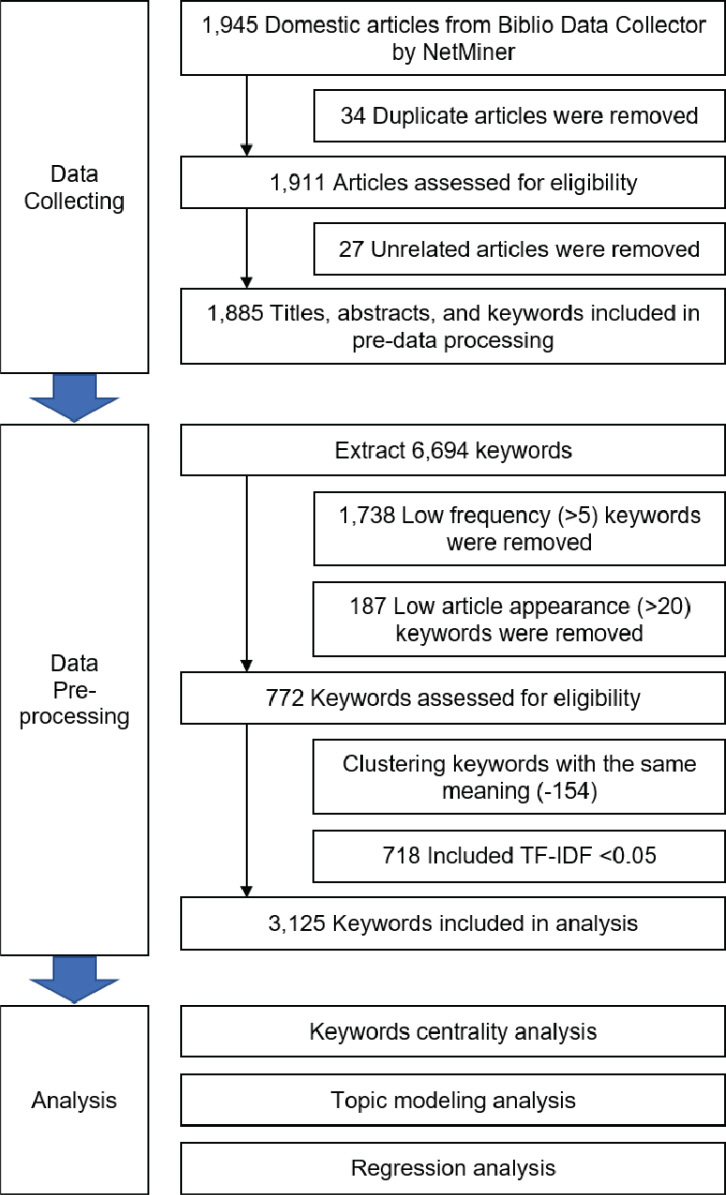
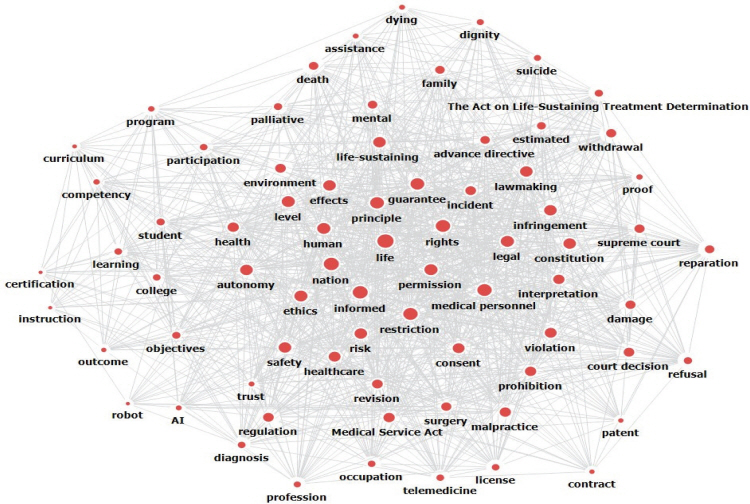
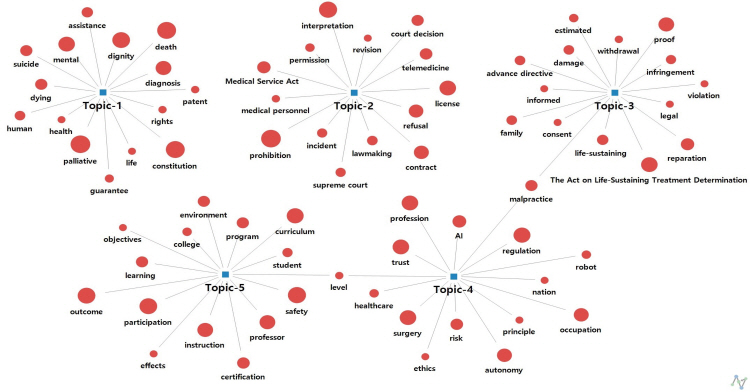
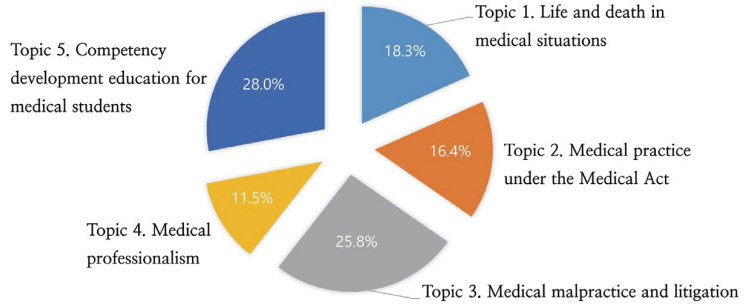
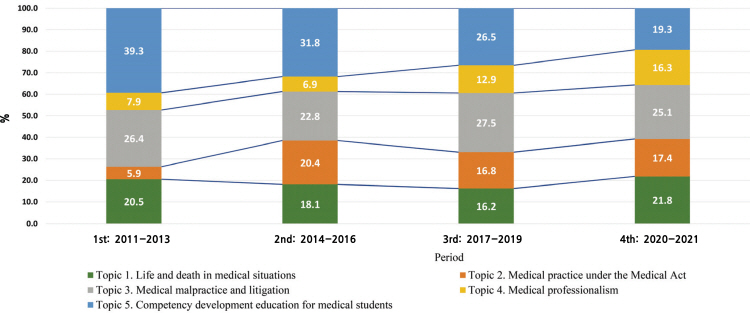
 PDF Links
PDF Links PubReader
PubReader ePub Link
ePub Link Full text via DOI
Full text via DOI Download Citation
Download Citation Print
Print


